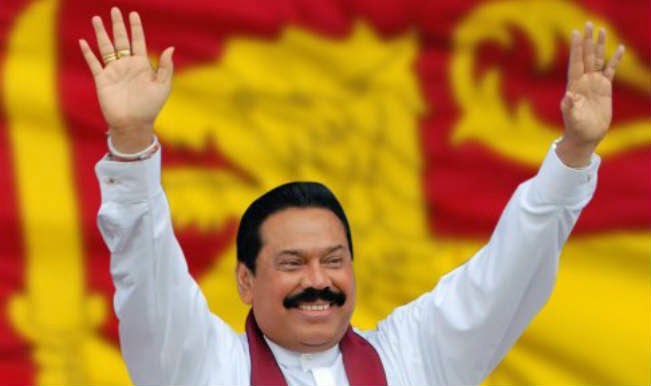It is four years since the 18th Amendment to the
Constitution came into effect. It was
dismissed at the time and occasionally since then as a subversion of the
democratic spirit and further entrenchment of dictatorial provisions in the J R
Jayewardene Constitution of 1978.
Now, four years later, the 18th Amendment is in
the news ago. There’s little or no talk
of democracy or dictatorship. The focus
is one individual, Mahinda Rajapaksa. The
question that is being addressed is whether or not he can run for a third
term.
What is strange is that all the self-proclaimed
constitutional pundits appear to have been in deep slumber for 4 years. That, or else, they were waiting for the
right moment to spring this ‘objection’, aiming clearly to catch the President
and his backers off guard.
It was the former Chief Justice Sarath N Silva who raised
the issue first. Sections of the
Opposition as well as prominent NGOs with dubious track records such as the
Centre for Policy Alternatives (recently accused of widespread fraud) have got
on the bandwagon. It smacks of
regime-hatred more than democracy-love.
So there’s objection and objection to objection. Silva’s argument, notwithstanding the
problematic nature of his position given his role in current political
processes, has excited the Opposition to the point of distraction. The focus is not on promoting a candidate
capable of winning it all (the Opposition seems hard pressed to find such a
candidate, in fact), but on stopping the president from contesting. Silva’s argument however is just one
interpretation and an interpretation that has too many holes as has been
pointed out by commentators who are not exactly regime-lovers.
Time will tell if Silva’s objection will be upheld by the
relevant authorities. Right now it seems
that when the Opposition says ‘Mahinda Cannot’ it is really saying ‘Mahinda
cannot be defeated’. It’s a sophomoric
way of conceding that the President is too strong a candidate to contend
with. In other words, the Opposition
(either in parts of together) cannot come up with a candidate that can go
head-to-head with the President on charisma, accomplishment and the promise of
all-important political stability, even if such a candidate could come up with a
plus in a compare-contrast of respective negatives (of Rajapaksa and the
Government on one side and on the other the candidate and his/her
backers). The best bet, then, is to get
the man off the ballot!
Interestingly, this lack of human resources is not the
preserve of the Opposition. Even the
UPFA cannot come up with a name that has the kind of overall appeal the
President enjoys. If he were to back
down, for example, the Opposition might think, ‘we have an outside chance
against an alternative candidate,’ while the ruling coalition would be less
cock-sure than it is now.
It would be simplistic to attribute this state of affairs to
the fact of incumbency. Incumbency helps
no doubt, given constitutional provisions and a scandalous culture of abuse by
whoever is in power. An alternative
candidate has less edge than incumbent but edge there will certainly be. In this case, the seeming ‘invincibility’
derives from multiple factors. These
include the defeat of the LTTE, a growing economy, a ‘doer’ image which is felt
in concrete terms, a general deference of the voter to a person of proven
strength and a general perception among a significant section of the population
that whatever the faults (his and his government) Mahinda is ‘one of us’.
The voter might not like the Government, might be appalled
by the strong arm tactics of ministers, MPs and members in other elected
bodies, disgusted by the flaunting of wealth by the president’s ‘near and dear’
and yet might find no one half as suitable to lead the country. Not in the ranks of the government and not
among the Opposition. This is why,
perhaps, that the Opposition is clinging to the Sarath N Silva ‘point’ while
those in the ruling party are so keen to dismiss the same.
‘Mahinda’, then, is a one-of-a-kind phenomenon, whether
anyone likes it or not and whether it is good or bad for democracy. “Government
by Mahinda, with Mahinda and for Mahinda and his ‘near and dear’ over and above
the rest of the people never mind budgetary tidbits tossed with election in
mind” is, in a democratic sense, clearly second best to “Government by the
people, with the people and for the people”.



4 comments:
cool read. if something is working adequately well, leave it alone.
Forgive my trespass
I’m blind to maps
Forgive for the love I give
For my life clock was wrecked
In some auspicious time
When reason was banished
And the wine of love
Seized heart…
The above words written for someone by you is true of what I feel for you. You would never know how much I love you Malinda,you would never know the intensity of my feelings- till my dying day I will love you.
It's not possible to say if the person actually means the words or just making a joke. However if it's a sincere expression of feelings, I think it's nothing to be amused at because there are so many 'in love' with artistes- those whose creativity is overwhelming. The words remind me of Nina in Sea Gull who was in love with Trigorin, the writer...
I think the comment is beautifully expressed. We often love the flawed. It would be better if the people we loved were themselves better people, but if they are the one we love, nobody else can take their place. A more equitable leader would be better, but if this leader is unbeatable and beloved, then there is nothing to do but accept that.
Post a Comment